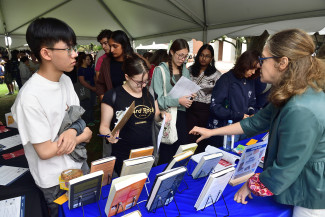
Johns Hopkins UniversityEst. 1876
America’s First Research University
Does literature have a public role? by Trevor Ross

Does literature have a public role?
During the later eighteenth century, people in Britain began to use “literature” as the collective term for imaginative works, including poems, plays and prose fiction. Though the name was new, the category wasn't. Since antiquity, works of verse, drama, and eloquent prose had all come under the designation of “poetry.” Nor was the category redefined. Critics before and since the eighteenth century have treated literature as a distinct art employing either beautiful words or engaging fictions. Philosophers from Plato to the deconstructionists have equated literature with the expressive use of language. Others, from Aristotle to speech-act theorists, have emphasized literature’s power to imitate or reimagine experience. The rise of the novel over the past three centuries has led many readers to equate literature with fiction, though the ascendancy of the lyric during the same period has prompted some critics to think that we can identify a special category of literary language.
The focus of my work is on the idea of literature and what happened to the idea during the eighteenth century to warrant a change in how it was identified. In an earlier book, The Making of the English Literary Canon, I argued that the change reflected a shift in emphasis in how imaginative works were valued. The word “poetry,” derived from the Greek word for making, had pertained to invention and imitation. The word “literature” originally had to do with reading, either the condition of being well read or the books that were available to read. The shift, then, from “poetry” to “literature” as the collective noun for imaginative works reflected a change in how these works were valued, a change from production to consumption, from valuing the social benefits that poets produced to valuing the personal benefits readers might derive from experiencing literary works. Poetry is composed and spoken, literature is read and studied.
In my new book, I delve deeper into the causes of the change. Specifically, I suggest that the liberty of the press necessitated a redefinition of the social benefits that literary works were believed to provide. It was not that the long revolution for free expression altered what we understand by literature so much as it transformed the nature and character of public discourse in general, so that, while literary works still worked pretty much the same way they had always done, the public function of literature changed because all other public discourses had changed. With liberty of expression becoming entrenched as a national value, the legal constraints on speech had to be reconceived, becoming less a set of prohibitions on its content than an arrangement for managing how things were said in the public sphere. The public was free to speak on any subject but its speech, jurists believed, had to follow certain ground rules, as formalized in laws aimed at limiting private ownership of culturally significant works, maintaining civility in public discourse, setting boundaries between the public and the private, and safeguarding public deliberation from the coercions of propaganda. For speech to be truly free, however, there had to be an enabling exception to the rules. Since the late eighteenth century, the role of this exception has been performed by the idea of literature. Literature is valued as the form of expression that, in allowing us to say anything and in any form, attests to our liberty. Poets, playwrights and novelists are our unacknowledged legislators because their works permit us to think beyond the laws and norms that regulate speech and behavior in the public sphere. They make it possible for us to keep public discourse free by permitting us to speak publicly about anything in expressive, personal, irrational, even uncivil language without fear of not being taken seriously in the public sphere.

This means that it is difficult to agree on what role literature plays in public life because in principle its role can never be settled. So it is that makers of agitprop will denounce claims like Auden’s that poetry makes nothing happen, challenge what they see as dubious distinctions between art and polemics, and insist that literature can change the world. In turn, Auden will dismiss his former colleagues’ manifestoes as the productions of a low dishonest decade, and agree with someone of a different political inclination like Orwell on the need to maintain a “frontier” between art and propaganda. Both sets of belief about literature, and many more, are at once tenable and contestable in a modern world in a way that was not so before the liberalization of speech.
By the end of the eighteenth century, literature became more indeterminate in the purposes it served. This does not mean that literature became either less or more important to public life than it had been previously. Nor is it the case that literature in a modern world is always indeterminate. On the contrary, it is a logical inference from its indeterminacy that literature can at times serve determinate purposes. For example, as I consider in the book's first chapter, it is possible to think of literary works as expressing national identities in a way that counterbalances the effects of marketplace competition and the ceaseless exchange of capital, two of the more potent conceptions of indeterminacy in the modern world. Likewise, it is possible to believe that literary works with no obvious political import, whether representations of subjective experience or formalist experiments with language, can have emancipatory effects by helping people transcend common perceptions. Literary works can serve continuity as much as change.
Literature’s purpose is as undefined, its forms as open to revision, and its constituent genres as open to debate as a democratic public is believed to be free to reinvent itself and the laws it lives by. At most, literature's public role can be described in negative terms by suggesting what literary works do not do. Literature, we are told by philosophers like Kant, is not designed to intervene directly in public debate or have clear utilitarian functions in the way that works of "poetry" were formerly believed to perform. Unlike other kinds of public discourses, furthermore, literature is not fixated on the present, observes no limits on expression or subject-matter, ignores norms of discursive rationality by conveying its truths with a distracting affectivity and penchant for making stuff up, yet does not mask its divergence from these norms even as it presents no typical or consistent formal features to distinguish it from other discourses. Above all, literature, perhaps even more so than the other arts, has no particular context of utterance and reception. Literature can be written by anyone, read or heard by anyone, without any legal, institutional or professional restriction on where, when or how any person may do these things. All persons can produce literary works, whether to articulate an identity, imagine other worlds and experiences, or make themselves heard in the public sphere. It can give individuals and communities a voice, mobilize them, or allow them to escape the public world of obligation and consequence. And it can do these things because it occupies no particular site of deliberation within the public sphere. Through literature, everything can be contemplated, from any perspective and in any form, and nothing is decided.
Trevor Ross teaches English at Dalhousie University. He is the author of The Making of the English Literary Canon: From the Middle Ages to the Late Eighteenth Century. Most recently he is the author of Writing in Public: Literature and the Liberty of the Press in Eighteenth-Century Britain


